
—John Stoltenberg, Interim Editor in Chief
(Originally published December 27, 2016)
Theater in DC has begun only recently to tell stories that attempt to be faithful to trans experience. Despite progress on local stages toward accurate portrayals of the lives of other populations marginalized on account of “difference”—those who are women, black, Latinx, Asian, queer, Deaf, or disabled, for instance—the lives of transfolk have been conspicuously unrepresented. And even when narratives about trans characters have been staged—for instance Ballast at Source Festival, the moving When January Feels Like Summer at Mosaic Theater Company, the delightful The T Party at Forum Theatre—the scripts have been by writers who are cis.
A refrain from the musical Hamilton comes to mind:
Who lives
Who dies
Who tells your story?
The increased visibility in theater of trans narratives, notably on stages in New York and Chicago, has been accompanied by off-stage soul-searching about not only authorship but casting—an intense conversation that HowlRound has been covering extensively.
The representation of trans lives in theater is of urgent relevance to the role of theater as change agent. It is no fashionable fad, no mere trend on the scene. This development portends, I believe, a fundamentally transformative moment—not only in producing theater but in raising human consciousness about all our genders in their wondrous multiplicity.
Mosaic Theater Company has propelled this propitious moment by programming Philip Dawkins’ Charm (winner of Chicago’s Jeff Award for outstanding new play) with an acting ensemble and creative team inclusive of folks who are transgender, cisgender, and gender-nonconforming.
Dawkins, who is cis, based the play’s main character, Mama Darleena Andrews, on the true story of an African American trans woman named Gloria Allen, who teaches etiquette and personal style to homeless transgender and gender-nonconforming youth at her Charm School in Chicago. Mama Gloria’s story is inspiring. That it is being dramatized at Mosaic bespeaks Mosaic’s determination to be a theater as diverse as DC is. To my knowledge no other company in town has dreamed as much, dared as much.
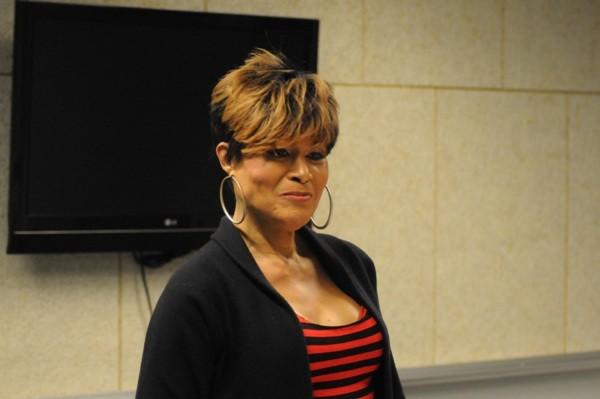
A very significant contribution to the conversation about trans representation in theater occurred recently when Mosaic, in response to self-questioning among artists working on the production and input from artists in the trans community, announced that a cis actor cast in the part of Mama Darleena would be replaced by a trans actor.
Explaining the change, Mosaic’s Founding Artistic Director Ari Roth said in a statement:
Plays often come with political imperatives, and we’ve come to understand that, at this moment, the politics of representation and empowerment of trans actors on our stages is of supreme importance. Our Charm ensemble already includes transgender actors and other contributing trans artists, but we’ve come to feel that the lead role of Mama Darleena really will be best served by a transgender actor…. Empowering a trans actor to drive the show is a way of undergirding the message of empowerment in this play.
It was an exemplary instance of a theater’s making change within toward creating change without.
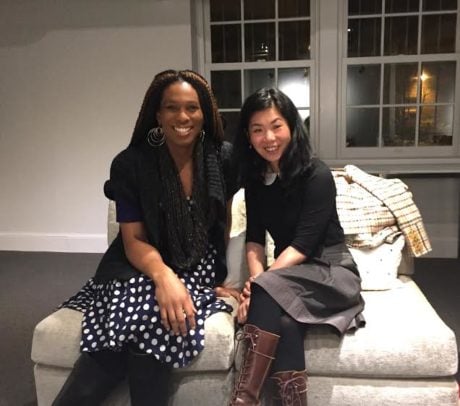
Early in 2016 I invited Dane Figueroa Edidi and Natsu Onoda Power to have a conversation on the critical topic of representation of trans lives in theater. I suspected they would have a powerful lot to say—and they did, over the course of two hours. What follows are excerpts from that conversation.
Dane Figueroa Edidi is DC’s most prolific, versatile, and multitalented trans theater artist. She is a playwright, actor, singer, performance artist, poet, dancer, and choreographer. She wrote a play called Absalom, which I greatly admired when I heard it read last season in Theater Alliance’s Hothouse New Play Development Series. (It’s a woman-centered retelling of the biblical story of Absalom, who, to avenge the rape of his sister by their half brother, had the half brother killed.) Dane is also a published novelist.
Natsu Onoda Power is the theater artist in DC who most prominently has directed plays about trans identities. She is currently directing Mosaic’s Charm, and she conceived, devised, and directed Forum Theatre’s The T Party, which I loved. (The title refers to words beginning with T such as transformation, trans, transcend.) Natsu is also a playwright and scenic designer and a professor of theater at Georgetown University. The two had not met before.
John: I’d like to begin by asking you to introduce yourselves. What would you like each other to know about who you are?
Dane: Well, I’m Lady Dane Figueroa Edidi, I’m really excited to be a part of this conversation, and I’m a Goddess. For me a Goddess is many things, in particular as pertains to divine beings and antiquity. Goddesses could be all things—sometimes loving, sometimes hateful, sometimes spiteful, sometimes messy as fuck.
I’m a playwright, I’m an actress, I’m a published author, and I cofounded a theater company, Force/Collision. But really at the end of the day all of those things are part of being a divine being as it manifests here in this flesh.
Natsu: Well, I’m Natsu Onoda Power. I’m afraid I’m not a Goddess.
Dane: But you are, though!
Natsu: I often joke that I don’t have friends, because I’m such an introvert. I stay at home and read my books. But I think of myself as a good friend, and I invest in being a good listener, which I think made me a playwright. I tell stories, other people’s stories but through other people. I’m too shy to get on stage and do it myself, so I just make friends do that for me, for my other friends. I’m a person invested in being a good friend, and now I’m a friend of a Goddess. That’s great.
Dane: It’s such a pleasure to finally meet you.
ON GENDER AND ACTING
I’d like to ask you—Dane as a writer and performer, Natsu as a writer and director—about the relationship between gender and acting. How have gender and acting played out in your life?
Natsu: Because I work primarily in new devised work, I sometimes have the cast already and then I write for them. So the gender of the characters is not predetermined; it’s a mix between how the actor identifies themselves and how the character identifies themselves. For me, that relationship makes an interesting play.
Dane: I wrote my first play when I was in middle school, and almost every play I’ve ever written has featured a trans character. The language wasn’t there in the ’80s and the ’90s when I started writing, but now I see it very clearly that that’s what I was doing.
I’ve always wanted to play divas. I wanted to play queens, I wanted to play Lady Macbeth. I never wanted to play Desdemona, but people wanted me to play Othello. And so in my training, there was this fight in the way people perceived my body—they were not feeding into my dream of being these amazingly great women. So what I did was study these great women’s roles separately aside. I would take the training that I was getting in class, and then I would utilize that as Clytemnestra or as Lady M or as Medea. And I would be in my room, practicing these monologues and learning these amazing women—because I knew that eventually we would get to this place.
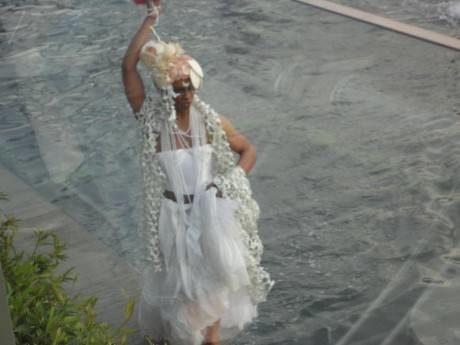
I cofounded Force/Collision with John Moletress, and in our first show, The Nautical Yards, John cast me as the goddess, because I’m trained in West African and Orisha dance. So I got to play Yemaya (The Orisha of the Sea and Mother of the World) in this devised work, and bring all that.
I went to New York. I did a cabaret. I sang a piece I wrote in 2005 about September 11. And John saw it and was crying and reached out to [the playwright] Erik Ehn, because he wanted us to do his piece Shape. And John said, “Would you be okay with Dane playing the lead in the show?” And what that did, for my career as an actress, is that it forced theater, and particularly DC theater, to see that I could be a leading lady and I could hold a show.
After that I remember sitting down with a good friend of mine, Lewis Feemster, who is also an actor, and I said, “I’m no longer going to play men on stage.” That choice shifted my entire life. It has given me a career and it has also influenced my personal life.
When you’re trans, people often think they can make assumptions about who you are off stage from who you play on stage. Being a trans actress wanting to be respected as an actress, I had to make the choice to no longer engage playing genders on stage that were not a part of who I was at the core of my being.
The training you were referring to had to be in some sense training within gender norms, and I hear you saying that you went extracurricular—
Natsu: Training is formal actor training, but it’s also how we’re trained in life from age zero, right? We’ve had all of the training and on top of it there’s actor training that theatricalizes it. So you had to do uber-extracurricular!
Dane: Yeah. One of my mentors is Michael Bobbitt, and he’s the first director in DC who cast me in a role that was written for a cis woman, in a show that we did a reading of at Round House [Theatre]. I had just graduated from university, and what that showed me was, I could actually sing these roles. And I could train that part of my voice, and I could be in musicals. The theater community, people who believed in me, were buying into and pouring into my vision for my career, but I learned I had to be better than the best. When I was on stage and working with the director, I had to bring everything of who I was for them to also buy into fighting for me.
Natsu: You just had to be a good actor. That’s just all there is to it. They just cast the best person, who makes the show most interesting, and that was you.
ON GENDER AND CASTING
When I was hanging out with actors back in the day, I remember, many of them were up against real career barriers because they didn’t embody binary gender in the way that’s culturally exemplary and aspirational. They didn’t have the look, the whatever, that could go out on stage and everybody would say, “Oh, there’s the dude. Oh, there’s the ingénue.” Those cookie cutters didn’t work for them. Is that still the case in acting as a profession—are actors still faced with that kind of dilemma?
Dane: In some places. I think we’re just getting to a point where people think that men playing women or women playing men’s roles is revolutionary.
Would you talk about cross-gender casting? You both have done it as theater makers.
Natsu: You know, it’s not even subversive for me. I did a play called Astro Boy and the God of Comics [at Studio Theatre 2nd Stage], and the protagonist, Astro Boy, is a robot, the little son of a mad scientist. I cast Astro Boy as a female-identifying actor. I thought she was the best fit for the role, she was wonderful. I’ve done Astro Boy twice, and both times I’ve cast a female. And people asked about it. “Why did you cast a female actor for Astro Boy?” It kind of shocked me because Astro Boy is a robot! And the second time, I cast this beautiful amazing actor, a Puerto Rican woman, for Astro Boy, and people asked about that choice too. “Why did you cast a woman of color as Astro Boy?” She was the best choice!
This tells me you were perceiving something about them as an acting talent that was beyond surface—
Natsu: It wasn’t just about acting talent, either. It was the qualities that this person had that was right.
Dane: For me it is political. I do it intentionally. There’s a character in Absalom that has to be played by a trans actress. It’s a historical piece, and I wanted to make sure that we acknowledge the existence of trans people and trans bodies within a historical context. Often when we talk about white supremacy or we talk about appropriation, what that really is, is erasure, that violence that is/born in erasure—the erasure of what I call mother goddess culture, which is that multiple genders, multiple gender performances and expressions, existed within these cultures. And they were all valid and they were essential and honored. So for me if I’m writing a historical piece, which most of my pieces are, it is really an act of revolution when I do that.
Natsu: When I was casting The T Party in Boston, I had three gender-nonconforming individuals who auditioned for me, and I cast two of them. One young trans woman I read for a cis woman part, because she was more right for that—.
Dane: That’s what it should be like. As a theater artist who’s also trans, I’m fine with that. I think when there’s a problem is when the erasure of trans people from the conversation happens.
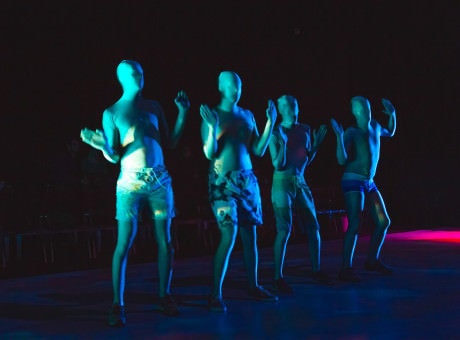
Natsu: When we did The T Party, I had friends at rehearsal who were unofficial dramaturgs. John came one time. It wasn’t just trans-identified people, but people who were actively transforming the ideas of gender around DC. But you know, shows that deal specifically with this topic actually are more difficult to cast. A play like War With the Newts that I directed [at Georgetown University]—it has a cast of 12, and the show doesn’t identify the gender of the characters. So that’s where the great potential is, I think, because sometimes the trans theme issues require the audience to read into the identity of the actor.
Dane: To be honest I don’t like trans themes.
Natsu: Right. It’s so much more difficult to cast and then to view, because sometimes the punch line or the point of the scene is the disjunction between what the audience automatically perceives according to their gender norms and what the scene says about this character. So sometimes, they’re the ones that are most conservatively cast. Only a couple of scenes in The T Party have to be cast that way. This character needs to read heterosexual cis male. That’s the point of the scene. And then now I have to audition and cast a cis heterosexual male.
Dane: Or not! You can also cast a trans man right, who—
Natsu: Right, if that person reads.
Dane: What I’ve also learned in theater is that generally after a while audiences forget. I believe as an actress that what we’re doing is creating a ritual, and we are summoning the spirits of these characters. And when we are fully engaging in the truth of what we were called to do—which is to be the embodiments of these beings of the muses, as they used to say in Greece—we are disappearing. People who have come to see it are signing a contract when they get a ticket to allow themselves to be taken into this ritual, into this summoning of spirit. And I’ve learned that in the hands of skilled actors it happens every time. People forget.
Natsu: The key word is the skilled actor. And the role has to go to the best actor that can carry that role.
Dane: Very true.
Natsu: You talked about training earlier. In the case of casting that cis male heterosexual actor, he’s had all his life extensive training in how to embody it.
Dane: I think now because people are being more open about their own identities, there are now more trans actors in the country who have the training and have the embodiment. The reality is we are all being trained to call this action “man” and that action “woman.” We are taught to even gender emotions and the expressions of said emotions all the time. I think it really depends on our diligence, and what we as the theater community really want to say not just to the audience but also to the world, and to those who are watching. So when I think about casting, I’m like, What statement do I want to make to the world?
ON THEATER AS CHANGE AGENT
I want to ask you to step back as an audience member, as someone who’s watching what’s being performed and not making it happen. I’d like you to look at theater as an art form for the kind of transformative experience that lets us see what we didn’t know was true or possible, and possibilities in terms of human embodiment and interaction. I’m curious to know your stories about those kind of transformative moments when you’ve seen someone on stage or seen some story that has just expanded your world.
Natsu: I feel like that happens all the time for me. I appreciate craft. I feel like theater for a long time—and I’m generalizing—has worked to erase the visible skills of the bodies that are on stage. Like, we’ve always said as compliments, “Oh, that was so natural. I believed it.” It erases. The craft is the invisibility of the craft.
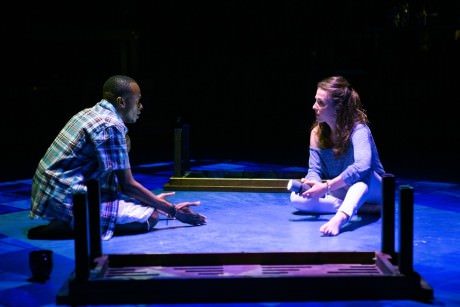
In Dontrell, Who Kissed the Sea at Theater Alliance, which Dane did the choreography for, there was this extraordinary performance at the center of it, Justin Weaks in the title role, Dontrell. That’s what sprang to mind when you were talking about craft because it was like you couldn’t take your eyes off of what he was doing.
Dane: Timothy Douglas, the director [of Dontrell, Who Kissed the Sea], kind of believes what I believe about theater, that we are conduits. And it was great to work with him and watch him work and talk to him and be a part of the creative production.
I had to listen to the bodies and the skills of the bodies that I had, because the dance at the end—it’s like you go through this whole hour and 20 minutes, and then you really get to the point of the show in which it is vigorous dancing for 15 minutes. It was an amazing ensemble of people, and they had to be really physically able to do that hard, hard, hard dancing, energetic and fast and furious and using parts of their body that colonization has told us as people of color that we should not use.
Say more.
Dane: Well, I combined traditional West African dance with Orisha dance from Cuba, and I also tried to find some other things from where the Orishas also manifest, like in Brazil, and add these elements into the piece. At a workshop called Decolonizing the Body, I always tell people that what it’s about is: How do we talk to the body in a way where we are engaging muscles that we have been told we shouldn’t use?
And I think Eastern forms, West African forms of theater, Asian forms of theater—all of these are really about us really being able to tap into that pre-colonized DNA and be able to tell these stories through gestures and movement and what that means.
Natsu: What’s presented as real is not really real. Realism is a style, a vocabulary that we recognize as real. My students talk about how when you look at movies from the past decades, they don’t sound like how real people talk. But how people sound on television and on stage today that you think is real, they don’t sound like real people either! Like, why are they speaking in complete sentences and making complete sense? Real people contradict themselves all the time.
Dane: I love watching shows, partly because I love being able to figure out who I can write pieces for! And then also I like to figure out what conversations are people having in their bodies. And you can tell. I think it’s the director’s job to give the subject matter, to say: This is the topic, now talk. It’s the job of the actor to say the words within their body, to have the language within the body.
Natsu: Yeah, that’s why rehearsals are so great, because my job is done when the play opens. I don’t like performances. I just like rehearsals! Especially with students.
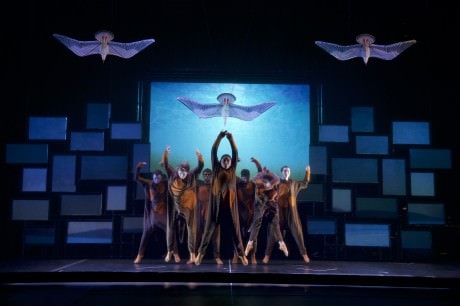
I did this piece called War With the Newts [at Georgetown University]. I adapted it from a 1936 novel by a Czech science fiction writer, [Karel Čapek,] and the characters are newts. So in rehearsal we started out trying to embody the newts. Like, how do newts stand? How do newts move? We weren’t basing it on actual newts because these are imaginary newts. And each student actor has a different approach to it. We’re trying to have a uniform newt vocabulary, but that is a conversation they’re having with their bodies for the first time. Someone is realizing, “Oh it’s so difficult for me to keep my center of gravity low the whole time.” And people are hurting in different places of their bodies. Like, “When I do this movement my arms hurt, when I do this movement my legs hurt.” That’s the dialogue they’re having with how they have been using their bodies all their lives, and the way they’re learning to use their bodies now
Dane: When I did Klytemnestra at Spooky Action—they produced the first workshop of it—I was the director, the choreographer, and the actress. And how I did it was, I directed it in the mirror. I wrote it without punctuation on purpose. I called it an epic slam poem, but it’s really a one-woman show. I guess it’s a style that is like taking poetry, like slam poem poetry style within a classical context, and making it into a play. So I guess it’s a form that I’ve created I guess through amalgamation of these different things.
Like the piece “Ode to Baltimore” that I heard you read at an AwQward noise [“an evening of Spoken Word by Trans Queer People of Color Artists”]?
Dane: Kind of like that but it’s put into a theatrical setting. And so I was thinking about colonization. And I took the story of Klytemnestra and made her this embodiment of Africa. And then the men in her life are all trying to kill her. So it’s like Agamemnon becomes the colonizer, and he takes over her body, and she’s constantly being colonized. Her first husband was a colonizer, and then her son, who is buying into this colonization, slays her at the end. And the furies come to vindicate her, and that’s what was happening in the Greek story. Like the gods basically say women aren’t needed to care about the children; they’re just vessels. And so within the classical context of the Oresteia it reduces women and their role to simple body parts that can be used at the whim of men.
So what I wanted to do is vindicate women, and I wanted to vindicate the goddess through this piece. I amalgamated styles from Kabuki, some from African dance. And as I was writing I was thinking of how would this character have a great moment of anger. And I remember she realizes that Agamemnon has lied about Iphigenia, and I directed it so I was looking forward to the audience as I had the moment of realization. And then I wanted to put Agamemnon into a corner. And she has this moment where Achilles is telling her, “I’m not really wanting to marry your daughter.” Like they’re going to kill her. And I took a moment and then I just said, “How would a person accuse someone of this thing?” And then I said “You!” And then I did that over and over again so by the time I did it on stage, I was able to do it like a storm.
And those are the types of things that when I’m watching theater I want to see. Like, if this character is supposed to be neurotic and erratic, how does the actor go from one conversation to the next and in an instant, as a person would in real life. And I tried to do that in my own work.
ON GENDER AND RACE IN PERFORMANCE
I think that trans experience can help illuminate how male supremacy and white supremacy are joined at the hip. They’re connected; they’re not separate systems. You’ve each conceived and created works that map to your heritage, Natsu’s as Asian-American and Dane’s as African-American. So I’m curious how you think about the connection between the performance of gender and the performance of ethnicity and race.
Dane: My good friend Otis [Ramsey-Zoë]—he’s a dramaturg in the city—once said this brilliant thing. We were talking about nontraditional casting, color-blind casting, representation, and he said, “Race is a visual conversation.” And I said, “Yes, yes.”
I’m a woman. I am trans. I am black. I am the daughter of an immigrant. I’m Nigerian. I’m Cuban. I’m Native-American. And so wherever I go as an actress, I take with me all of the gifts and the skills that those indigenous identities have given to me. I love being who I am, because I come with skills that allow for me to see the world in a way that is deep. And I am blessed to be black. I am. I love it. I love being black!
I wrote a musical called Roaring that’s about a 1920’s trans star, and some of the characters have to be white. They have to be. I think there’s three white characters in the show, and everyone else is black. They have to be white. There’s reference to it in the text.
Natsu: Some shows are just about that—visible markers of whatever you think the actors embody and have lived, and the conversation between how we recognize the actor and what the scene says. These are the trickiest things to cast, because if you want to make a political statement by casting differently then you wouldn’t be making a statement at all if you did.
I grew up in Japan until I was 20 where there’s like only Japanese people. I also grew up on the countryside so everybody else has lived there for hundreds of years. Nobody leaves. My grandparents moved there 55 years ago with my father as a little child then, and they’re still the new family in the village because nobody moves. So growing up I was just a person. I was not particularly a Japanese person or Asian person.
It was only when I moved here, my freshman year of college, that I realized I was not just a person, I was an Asian person, which was a really interesting concept for me to get used to. And now I’m conscious of it every single day. My experience of everyday life is different from a white person’s because I am visibly Asian. It’s the first thing that people notice. Well, the first thing that people notice about me is my gender, my embodied gender, and the second thing is the race.
Even if you’re not doing anything to perform it?
Natsu: No. No, no, no. People ask me, maybe on a weekly basis, where I’m from, and with good intentions they try to talk to me in Chinese and Vietnamese and Korean and Japanese.
Dane: And these are non-Asian people.
Natsu: Yeah. And cis men. This is a huge part of cat-calling on the street. I’m always confronted with my visible identity. And at first it’s a shock, because I thought I was just a person, but now I’m exotic.
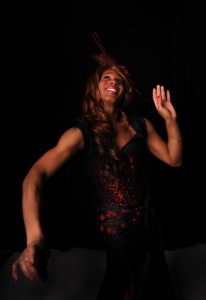
Dane: I think it’s white supremacy consuming us. Like, consuming women, consuming anyone they want to sexualize. Consuming people of color, exotifying, tokenizing. I have been blessed to work with black directors who cast me because I’m a black actor in the city. But then there are a lot of shows in which I have been cast not because I’m a person of color. Like in The Wedding Dress at Spooky Action, I played one of the female leads, Madame Clessi. It was also a hard role because I was sexually molested, and I was physically abused by my brother until I was 13 years old. I have a history dealing with men being violent. In the show Madame Clessi is killed by her young lover [played by Rafael Sebastian Medina]. And there’s a scene in which Rafael, who was in The T Party, had to—like, it was very difficult. And I remember some nights it would just be so hard for me, because I would be triggered and I’d be like “oh God”. And then I would get off stage.
And Rebecca [Holderness] the director spent a lot of time building up relationships so that I felt safe being able to go to these hard places onstage. But it also happened with Michael Kevin Darnall in The Last of the Whyos [at Spooky Action].
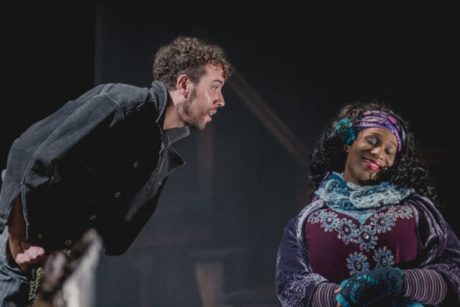
We were talking about race and how that looks and how that plays out on stage. Michael is black, but sometimes he passes as white on stage depending on the show, and he was the lead. There were scenes when he (his character) was really just mean, and it was hard and it was difficult. But Michael and I had conversations backstage about the fact that he was a black man and I was a black woman, and we were having this interaction with one another onstage, and what conversation that created—because we were two black people in these scenes of heightened violence. And there was another character who was also in scenes of heightened violence with another male character, and both of them were white. And so it was a very, very interesting thing to think about how the conversation shifted to see these couples—one white, one black, both of them abusive—and what conversation that was creating around misogyny, patriarchy, men, and how it manifests within communities.
ON SEXUAL ABUSE AND TRANS NARRATIVES
Dane: There’s a piece I wrote called White Baby Jesus, a Trans Woman Speaks.” I wrote it in a great heightened state of like sorrow, because my brother had come back to live with my mom. I was at my mom’s place for two months, and my brother came to live with his wife. And it was just triggering every day to walk out of the room and then see—
He was your abuser?
Dane: Yes. And one night when I was like in hysterics I wrote this piece. It was read at Spooky Action, directed by Mark Hairston. It’s a one-woman show. It’s an epic slam poem style, and it is about this little trans girl who has just been abused and she’s just been raped, and it’s her going into her kind of mind searching for the black goddess. And she goes through this almost Persephone journey. And these goddesses come and speak to her, and it’s not until the end when she realizes that she herself is the goddess that she’s been searching for.
Natsu: I think in the theater profession you encounter a lot of people who have been sexually abused. I was abused by my grandfather as a little child for a long time, and it’s still kind of not resolved, you know what I mean? I also think that trans narratives and abuse narratives are a really tricky match with each other because the audience wants to make the cause-and-effect connection.
Dane: Right.
Natsu: And I hate that.
Dane: I agree, yeah.
Natsu: For instance Bad Education, an Almodovar film. It’s a brilliant movie, but my trans student from last semester had a really negative reaction to it. He said, well, this is the kind of narrative that makes the common narrative “something bad happened to this person that made them trans.”
Dane: —Or something bad happens because the person is trans, right?
Natsu: Yeah, yeah. Like The Crying Game. The plot twist is that this person is trans. It’s time to move on to different kinds of narratives. I think these kinds of narratives served well. Like, for a time maybe did a little harm and a little good. But we need to break this cause-and-effect logic between the abuse narrative and the trans narrative.
Dane: I generally don’t write trans characters who are in dismay. And that was a political statement for me, because I think white supremacy’s desire to consume us—and when I say us, I mean me and you—is not just to sexualize us, but also to say: You must be traumatized in order for me to care about you.
Natsu: Right.
Dane: And so it says: In order for me to see you as a human being, I first have to inflict violence on you, and then you have to bleed, and then I can believe that you are who you say you are. I want to reject that kind of suffering for authenticity. Because often what those stories say is that trans people are unlovable and trans people cannot find love because they are trans. And that just isn’t true.
Natsu: So not true.
Dane: I’m very loved. I’m very honored. I’m very cared about.
Natsu: Well, it’s also because you are a beautiful charismatic human being, which is also part of who you are, and trans is just a part of who you are. Like my Asianness doesn’t subsume my other qualities.
Dane: But white supremacy says that they should, right? Like, white supremacy says all of these other amazing things that you are have to go away because you’re Asian.
Natsu: It’s a small part of who you are; it’s just a very visible part.
ON THEATER THROUGH THE LENS OF TRANS EXPERIENCE
I’ve been engaged in an ongoing conversation with trans feminist Cristan Williams that is online at The Conversations Project. One of the things I’ve been trying to do is to follow my hunch that trans experience offers important insights that can be of revelatory value to people who aren’t trans. I don’t mean to appropriate trans experience; I just mean that people who know trans experience firsthand are naming stuff about gender and society and the world in ways that most people don’t think to think about. And I believe bringing that to consciousness is a kind of gift that theater can offer people who don’t identify as trans.
Dane: I think all of us are constantly fighting with the narratives we’ve been given as opposed to the narratives of who we actually are. So what I am grateful to theater about is that theater is a mirror. The most interesting actors to me are those actors who hold up the mirror to themselves and are forced to confront all of who they are every time they accept a role and they’re on stage. Those are the roles that I chose to engage for myself as an actress. Roles that sometimes are easy for me to play. Sometimes not. But roles that always force me to hold the mirror to myself. So that means that I, Dane, have to come to the theater whole. I have to come to the theater fully ready to engage all of who I am in order to engage all of who the character is saying that they are.
Natsu: I have a new metaphor! Maybe rather than a mirror, theater is like a projector. It takes something from a life and projects it back, usually larger than life. And theater does that. I work with projectors a lot. And a projector is a complicated mechanism that has a history within it that takes something from life or takes something that somebody has crafted, but projects it larger according to its own system, and it’s public. You can look at the mirror in private. A projector is public.
Dane: I think we are the mirrors for each other. I think that any relationships we’re in are also public mirrors, because we are.
Most trans people know exactly who they are by the time they’re three, and what society then does is say, No you’re not; you’re this other thing.
Trans is a very westernized American concept. Trans identities have existed, and that’s why in my writings I often make a distinction between trans identities and the term transgender.
Natsu: Right. Trans realities have existed. Maybe this is a historical moment where cis gender identity has been so solidly inscribed in the culture that it makes trans identities visible as anomaly.
Dane: Yeah. If we think about indigenous cultures—who were here before Europeans came and massacred everybody and gave them diseases and shit—we existed. There were different names because the ideas of gender were different. So it isn’t that we didn’t exist but we were within a cultural framework.
Natsu: And it wasn’t anomaly.
Dane: We other them—because colonization gives us this strict binary in all things. This is what this is. This is what this is.
I think the greatest crime of white supremacy is having those of us who are people of color buy into its idea of how we should love one another.
ON THEATER AS CHANGE AGENT (CONTINUED)
As people who write, direct, cast, look at other performers, when you look at people acting in life or on stage, what do you wish you could change about the world they live in, work in, perform in? What would make for better parts, better scripts, better scenes? Let’s say you see someone and their body is colonized, to use your language, and you can’t have a chance to work with them and work them through it or help them through it. What would be the world in which that wouldn’t have happened?
Dane: I grew up around artists. My aunt was a jazz singer. She was also a revolutionary. She was curator of the Great Blacks In Wax Museum of Baltimore, and so I grew up around history and also music. Everyone in my family sings. My grandfather, even though he passed away before I was born, was a guitarist. And I saw how music and art could change the world. And so when I create work, part of my creation of work is: How do I leave this work so that places that train, places of institute, want to prioritize people like me?
For example with Roaring, [my writing partner, the composer] Andrew Morrissey is cis white gay. I am black trans woman. When we came together, I said: Andrew, this is my idea. And Andrew said, I will follow your leadership and I’ll do what you tell me to do, and we have a beautiful partnership in this work. I said I want us to revolutionize musicals, and through that I want us to revolutionize the priorities of universities, acting programs across the world. I said, I want this piece to go to Broadway, not because I think Broadway means anything, but what Broadway will do is give this piece the ability to be performed around the world. Not only will be hiring trans actors, but we will also be changing the dialog, and I as a trans person will be putting trans people at the forefront of the dialog, controlling the dialog.
So I say: What have we as theater people not done that we are called to do, which means be the change makers. Be the revolutionaries. How have we participated in the erasure of identities, cultures, people? How have we participated in the evils of capitalism? I know we all have to eat and we have to make money and I get that, but how have we not believed that we can love and support, honor and shift worlds by putting dialog on stage that is revolutionary? That’s my answer.
Natsu: That’s why I think theater is like a projector. It doesn’t merely reflect; it actively makes things in the world. People are receptive to narratives. People are more affected by experiences and stories than theories and slogans. Theater reaches people in deep profound levels. We know how to trigger emotional responses. How do we infuse it with contents that shape and change the world?
Dane: And not tokenize us. I no longer want to play trans people on stage who are written by cis people, because I think we’ve seen that enough. Sometimes it works brilliantly, sometimes it doesn’t. I’m really interested in how do we engage trans people for all of who we are. No longer just: I will tokenize your existence and only care about trans people as a cis person tells me I should—because that means cis people are controlling the dialog. I will actually engage bringing trans people into the room fully. And that means in every aspect of creative. That means writers, choreographers, actors. I think it’s imperative for us to have ownership of our own stories, because for so long cis people have controlled the story. And 90 percent of the time it doesn’t end well for us. Sometimes theater with best intentions will tokenize people for that emotional response while catering to a white-supremacist consumerist idea of our identities without really understanding that we’re more than just one aspect of ourselves. I’ve been blessed to play mostly cis women for the recent part of my career. So for the past three years I’ve been primarily playing cis women and I’ve been blessed to do that and that’s also because I’ve worked very hard for very long, having to prove my skill.
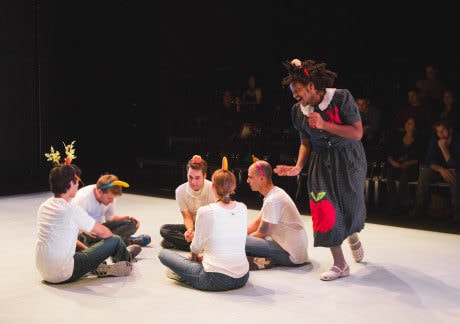
Natsu: As a cis woman who has written a trans play, The T Party, I almost didn’t say yes to the Boston production [at Company One Theatre]. Like, I thought there just no reason for this play to happen anymore. There are a lot of trans artists who are writing brilliant things, and, like, who am I, you know? I only said yes to it with the strong encouragement and blessing of my friends in the trans community. I felt responsible toward my friends who are in their 50s and 60s whose experiences have not been the same as my friends in their 20s and 30s. Who still feel very old-fashioned oppressed.
Dane: I think you have to love yourself first and then I think you have to have enough love for yourself that it is so abundant that you can love others—but you have to love that more than you love your fear. And the bravery of myself to do the things that I have done is because I have had to love myself when other people told me I shouldn’t be loved.
I’m not just a theater artist; I am also an activist. I’m not just a person who’s creating theater. I’m also a person who’s engaging in marginalized communities daily. And I’m a part of that community.
Trans people are a confrontation with the patriarchy. That’s part of the pushback, the choice to honor who you are. Trans people are engaging how we should perform gender and what that looks like for each of us—whether you’re cis or trans or genderqueer—what that looks like for us individually as people, to make a choice.
We as theater people cannot back down in our diligence of truth telling. If you want to have a false picture-painted narrative of the world, all you have to do is turn on certain TV stations. But if you want to really be part of the shifting of consciousness, you have to engage the dialog where you’re centering the most marginalized, and we as theater makers have an incredible calling, an incredible task, but also the gifts to change the world.





Followup coverage from The Washington Post:
“Is it OK to cast a cisgender actor in a trans role? A D.C. theater just changed its mind.”
http://wpo.st/W0sP2